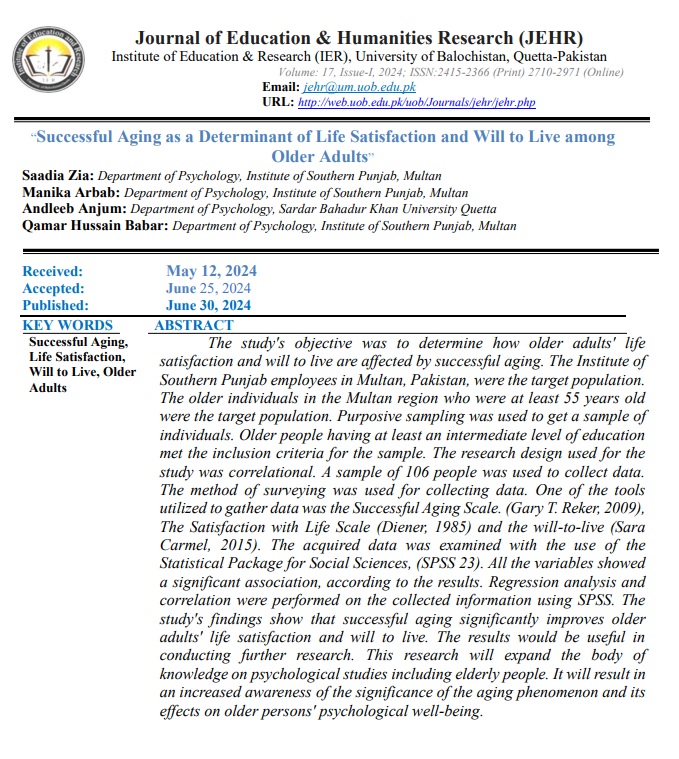Successful Aging as a Determinant of Life Satisfaction and Will to Live among Older Adults
Keywords:
Key words: Successful Aging, Life Satisfaction, Will to Live, Older AdultsAbstract
The study's objective was to determine how older adults' life satisfaction and will to live are affected by successful aging. The Institute of Southern Punjab employees in Multan, Pakistan, were the target population. The older individuals in the Multan region who were at least 55 years old were the target population. Purposive sampling was used to get a sample of individuals. Older people having at least an intermediate level of education met the inclusion criteria for the sample. The research design used for the study was correlational. A sample of 106 people was used to collect data. The method of surveying was used for collecting data. One of the tools utilized to gather data was the Successful Aging Scale. (Gary T. Reker, 2009), The Satisfaction with Life Scale (Diener, 1985) and the will-to-live (Sara Carmel, 2015). The acquired data was examined with the use of the Statistical Package for Social Sciences, (SPSS 23). All the variables showed a significant association, according to the results. Regression analysis and correlation were performed on the collected information using SPSS. The study's findings show that successful aging significantly improves older adults' life satisfaction and will to live. The results would be useful in conducting further research. This research will expand the body of knowledge on psychological studies including elderly people. It will result in an increased awareness of the significance of the aging phenomenon and its effects on older persons' psychological well-being.
References
Au, A., Ng, E., Garner, B., Lai, S., & Chan, K. (2015). Proactive aging and intergenerational mentoring program to promote the well-being of older adults: Pilot studies. Clinical Gerontologist, 38(3), 203-210.
Baltes, P. B., & Baltes, M. M. (1990). Psychological perspectives on successful aging: The model of selective optimization with compensation.
Bowling, A. and Dieppe, P. (2005). What is successful ageing and who should define it? BMJ, 331, 1548–1551
Bowling, A. (2007). Aspirations for older age in the 21st century: what is successful aging? International Journal of Aging and Human Development, 64, 263–297
Carmel, S., & Mutran, E. (1997). Wishes regarding the use of life-sustaining treatments among elderly persons in Israel: An explanatory model. Social science & medicine, 45(11), 1715-1727
Carpentieri, J. D., Elliott, J., Brett, C. E., & Deary, I. J. (2017). Adapting to aging: Older people talk about their use of selection, optimization, and compensation to maximize well-being in the context of physical decline. Journals of Gerontology Series B: Psychological Sciences & Social Sciences, 72(2), 351- 361.
Colvin, A. D., & Bullock, A. N. (2016). A review of the biopsychosocial aspects of caregiving for aging family members. Journal of Family Social Work, 19(5), 420-442.
Crowther, M., Parker, M., Achenbaum, W. A., Larimore, W., & Koenig, H. (2002). Rowe and Kahn‘s model of successful aging: Spirituality—The forgotten factor. The Gerontologist, 42(5), 613–619.
Diener, E. D., Emmons, R. A., Larsen, R. J., & Griffin, S. (1985). The satisfaction with life scale. Journal of Personality Assessment, 49(1), 71-75.
Grohol, J. (2009). The Power of the Will to Live. Psych Central.
Heckhausen, J. (1997). Developmental regulation across adulthood: Primary and secondary control of age-related challenges. Developmental psychology, 33(1), 176
Hatchett, B. F., Garcia, L., & Marin, C. (2001). Significance of family involvement for older Mexican American women: Implications for practice. Journal of Family Social Work, 6(2), 55-68.
Jahan, M., & Khan, S. (2014). Psychological well-being: Spirituality and successful aging. Indian Journal of Health & Wellbeing, 5(7), 68-71.
Kinsella, K. G., & Phillips, D. R. (2005). Global aging: The challenge of success (Vol. 60, No. 1, p. 3). Washington, DC: Population Reference Bureau.Lemoine, M. (2020). Defining aging. Biology & Philosophy, 35(5), 46.
Lang FR and Heckhausen J (2001) Perceived control over development and subjective well-being: Differential benefits across adulthood. Journal of Personality and Social Psychology 81: 509–523.
Lopez, S. J., Pedrotti, J. T., & Snyder, C. R. (2018). Positive psychology: The scientific and practical explorations of human strengths. Sage Publications
Pavot, W., & Diener, E. (2009). Review of the satisfaction with life scale. In Assessing well-being (pp. 101-117).
Preschl, B., Maercker, A., & Wagner, B. (2011). The working alliance in a randomized controlled trial comparing online with face-to-face cognitive- behavioral therapy for depression. BMC Psychiatry, 11(1), 1-10.
Reker, G. T., & Woo, L. C. (2011). Personal meaning orientations and psychosocial adaptation in older adults. Sage open, 1(1), 2158244011405217.
Ryff, C. D. (1989). Beyond Ponce de Leon and Life Satisfaction: New directions in quest of successful ageing. International journal of behavioral development, 12(1), 35-55.
Nimrod, G., & Ben-Shem, I. (2015). Successful aging as a lifelong process. Educational Gerontology, 41(11), 814-824.
Shrira, A., Carmel, S., Tovel, H., & Raveis, V. H. (2019). Reciprocal relationships between the will-to-live and successful aging. Aging & Mental Health, 23(10), 1350-1357.
Strawbridge, W. J., Wallhagen, M. I., & Cohen, R. D. (2002). Successful aging and well-being: Self-rated compared with Rowe and Kahn. The Gerontologist, 42(6), 727-733.
Takagi, E., & Saito, Y. (2013). A longitudinal analysis of the impact of family support on the morale of older parents in Japan: Does the parent's normative belief in filial responsibilities make a difference? Ageing & Society, 33(6), 1053-1076.
Tovel, H., & Carmel, S. (2014). Maintaining successful aging: The role of coping patterns and resources. Journal of Happiness Studies, 15(2), 255-270.
Wagnild, G. (2003). Resilience and successful aging. Comparison among low and high income older adults. Journal of Gerontological Nursing, 29, 42–49.




